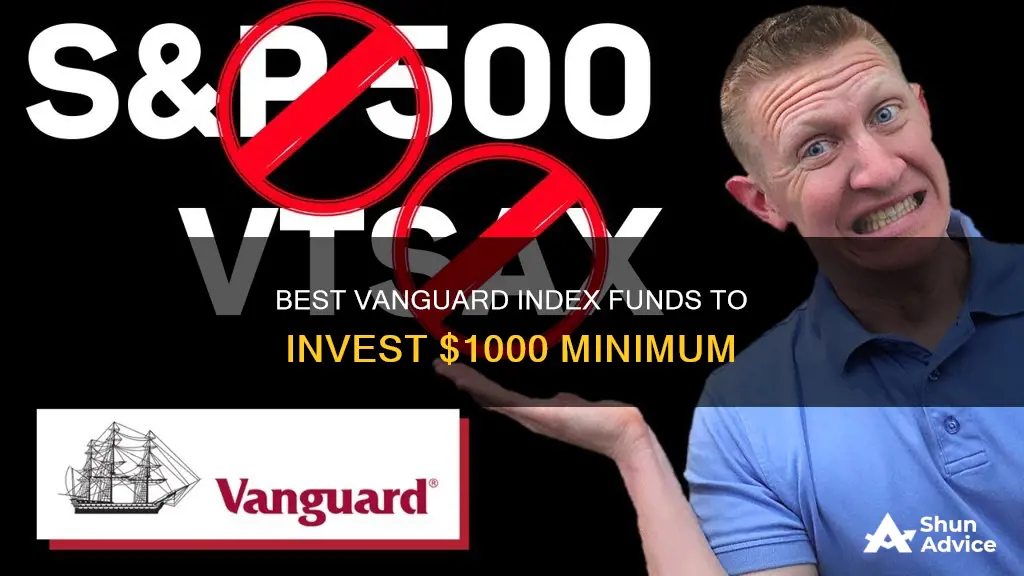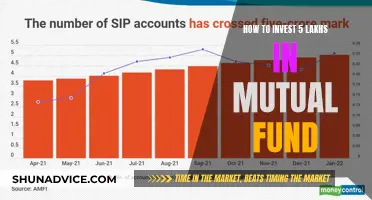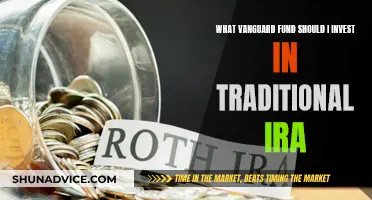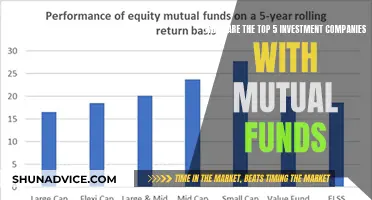
Vanguard is a popular choice for investors due to its reputation for low costs and high-quality offerings. Vanguard's index funds are particularly appealing for long-term investors. The company offers a wide range of investment options, including passive index funds and actively managed funds.
When considering which Vanguard index fund to invest a minimum of $1,000 in, it is important to assess your financial goals, risk tolerance, and investment strategy. Here are some factors to consider:
- Investment Objective: Determine whether you prioritize growth, income, or a combination of both.
- Risk Profile: Evaluate the fund's volatility and ensure it aligns with your risk tolerance.
- Expense Ratio: Compare the expense ratios of different Vanguard index funds to find the most cost-effective option.
- Initial Investment: Some Vanguard index funds require a minimum initial investment of $3,000, while others offer lower minimums or even fractional shares.
- Diversification: Consider the fund's asset allocation and geographic focus to ensure a diverse portfolio.
- Vanguard Total Stock Market Index Fund Admiral Shares (VTSAX): This fund offers broad exposure to the U.S. equity market, including small-, mid-, and large-cap stocks, with a low expense ratio of 0.04%. However, it requires a $3,000 minimum investment.
- Vanguard 500 Index Fund Admiral Shares (VFIAX): This fund tracks the S&P 500, providing exposure to 500 large- and mid-cap U.S. companies. It has a low expense ratio of 0.04% but also requires a $3,000 minimum investment.
- Vanguard Total International Stock Index Fund Admiral Shares (VTIAX): For international diversification, this fund tracks over 8,600 stocks from developed and emerging markets, with a 0.12% expense ratio. The minimum investment is $3,000.
- Vanguard Balanced Index Fund Admiral Shares (VBIAX): This fund follows a classic 60/40 strategy, investing 60% in U.S. stocks and 40% in U.S. bonds, offering a balanced approach with a low expense ratio of 0.07%. The minimum investment is $3,000.
- Vanguard Target Retirement 2030 Fund (VTHRX): This fund is ideal for investors retiring around 2030, as it gradually shifts from stocks to bonds as the target date approaches. It has an expense ratio of 0.08% and a minimum investment of $1,000.
Remember to carefully consider your investment goals, risk tolerance, and conduct your own research before making any investment decisions.
| Characteristics | Values |
|---|---|
| Initial Investment | $1,000 to $3,000 |
| Expense Ratio | 0.08% to 1.8% |
What You'll Learn

Vanguard's low-cost funds
Vanguard is a popular choice for investors looking to invest in index funds. Index funds are a form of passive investing, where investors aim to match rather than beat market moves for long-term gains. Vanguard is the world's largest originator of index mutual funds, with $9.3 trillion in assets under management as of March 2024.
Vanguard offers a range of low-cost funds that are particularly appealing for long-term investors. Here are some options to consider:
- Vanguard 500 Index Fund Admiral Shares (VFIAX): This fund gives investors exposure to 500 of the largest US companies, which make up 75% of the US stock market's total value. It has a minimum investment of $3,000 and an expense ratio of 0.04%.
- Vanguard Total Stock Market Index Fund Admiral Shares (VTSAX): This fund covers the entire US equity market, including small-, mid-, and large-cap growth and value stocks. It also has a minimum investment of $3,000 and an expense ratio of 0.04%.
- Vanguard Growth Index Fund Admiral Shares (VIGAX): This fund focuses on stocks in large US companies in sectors with higher growth potential, such as technology, consumer services, and financial services.
- Vanguard Small-Cap Index Fund Admiral Shares (VSMAX): This fund targets smaller publicly held companies for investors who want to diversify away from larger public companies.
- Vanguard Total Bond Market Index Fund Admiral Shares (VBTLX): This fund provides wide exposure to US investment-grade bonds, investing about 30% in corporate bonds and 70% in US government bonds.
- Vanguard Balanced Index Fund Admiral Shares (VBIAX): This fund diversifies its investments, with roughly 60% in stocks and 40% in bonds, to balance growth and stability.
- Vanguard Total International Stock Index Fund Admiral Shares (VTIAX): This fund tracks stock indexes in both developed and emerging markets outside the US. It has a minimum investment of $3,000 and an expense ratio of 0.12%.
When choosing a Vanguard fund, investors should consider their portfolio mix and investment goals. It's important to note that while Vanguard has a long history of strong performance, all investments carry risk.
Debt Fund Investment: Choosing the Right Option
You may want to see also

Vanguard's instant diversification
Vanguard is a pioneer in passive investing, which aims to match rather than beat market moves for long-term gains. As total stock market values tend to rise over time, Vanguard's index funds aim to capture the entire market gains for investors. Vanguard's index funds track the performance of a single market index, such as the S&P 500 or Nasdaq, to mirror its total market returns.
Vanguard's index funds provide instant diversification, which is a key benefit for investors. Diversification spreads out risk and reduces the impact of volatility. By investing in a broad range of securities across an entire stock index, Vanguard's index funds offer investors a way to mitigate risk and potentially achieve long-term gains.
Vanguard offers a variety of index funds to choose from, including the Vanguard 500 Index Fund Admiral Shares (VFIAX), Vanguard Total Stock Market Index Fund Admiral Shares (VTSAX), and Vanguard Total International Stock Index Fund Admiral Shares (VTIAX). These funds have different investment minimums and expense ratios, so investors can choose the one that best fits their portfolio mix and financial goals.
Vanguard also offers exchange-traded funds (ETFs) that provide instant diversification. ETFs have no minimum investment and can be bought and sold throughout the day like stocks. They are also often more tax-efficient than index funds.
Overall, Vanguard's instant diversification through index funds and ETFs provides investors with a range of options to invest in a diversified portfolio of securities, potentially reducing risk and improving long-term returns.
Money Market Funds: Where Are Your Investments Going?
You may want to see also

Vanguard's historical performance
Vanguard is the world's No. 1 originator of index mutual funds, with $9.3 trillion in assets under management as of March 2024. Vanguard's index funds kick-started the passive-investing revolution, where investors try to meet rather than beat market moves for long-term gains.
Vanguard's index funds track the performance of a single market index, such as the S&P 500 or Nasdaq, to mirror its total market returns. The company offers index funds that mirror the bond markets, buying and selling government and corporate debt, which are considered safer investments, although they have smaller returns.
Vanguard has a long history of strong performance. Over the last 10 years, 271 of 316 Vanguard funds outperformed their Lipper peer-group averages. This includes 6 of 6 Vanguard money market funds, 83 of 98 Vanguard bond funds, 21 of 23 Vanguard balanced funds, and 161 of 189 Vanguard stock funds.
- Vanguard 500 Index Fund Admiral Shares (VFIAX): This fund gives investors exposure to 500 of the largest US companies, which make up 75% of the US stock market's total value. It has a minimum investment of $3,000 and an expense ratio of 0.04%.
- Vanguard Total Stock Market Index Fund Admiral Shares (VTSAX): This fund covers the entire US equity market, including small-, mid-, and large-cap growth and value stocks. It has a minimum investment of $3,000 and an expense ratio of 0.04%.
- Vanguard Growth Index Fund Admiral Shares (VIGAX): This fund focuses on stocks in large US companies in sectors with higher growth potential, such as technology, consumer services, and financial services.
- Vanguard Small-Cap Index Fund Admiral Shares (VSMAX): This fund targets smaller publicly held companies for investors who want to diversify away from larger public companies.
- Vanguard Total Bond Market Index Fund Admiral Shares (VBTLX): This fund gives wide exposure to US investment-grade bonds, investing about 30% in corporate bonds and 70% in US government bonds.
- Vanguard Balanced Index Fund Admiral Shares (VBIAX): This fund mixes its investments between stocks (roughly 60%) and bonds (about 40%) to balance growth and stability.
- Vanguard Total International Stock Index Fund Admiral Shares (VTIAX): This fund tracks stock indexes in both developed and emerging markets across the globe. It has a minimum investment requirement of $3,000 and an expense ratio of 0.12%.
Mutual Fund Investors: Owners of a Diverse Portfolio
You may want to see also

Vanguard's range of funds
Vanguard is a popular choice for investors, with a long history of strong performance and a range of funds to choose from. Here's an overview of some of Vanguard's funds:
Vanguard index funds: These funds were pioneers in passive investing, aiming to match market moves rather than beat them for long-term gains. Vanguard offers a wide range of index funds, including the popular Vanguard 500 Index Fund Admiral Shares (VFIAX), which gives investors exposure to 500 large US companies. Vanguard also offers total stock market index funds, growth index funds, small-cap index funds, and more.
Vanguard mutual funds: Vanguard offers a wide selection of mutual funds with different investment objectives, strategies, and indexes tracked. Some examples include the Vanguard Total Stock Market Index Fund Admiral Shares (VTSAX), Vanguard Growth Index Fund Admiral Shares (VIGAX), and Vanguard Value Index Fund Admiral Shares (VVIAX).
Vanguard exchange-traded funds (ETFs): ETFs are a flexible option as they carry no minimum investment and can be traded throughout the day like stocks. Vanguard offers a range of ETFs, including the Vanguard Total Stock Market ETF (VTI) and Vanguard S&P 500 ETF (VOO).
Vanguard target retirement funds: These funds are designed to be a complete portfolio solution for investors, gradually adjusting their risk profile over time. An example is the Vanguard Target Retirement 2070 Fund (VSVNX), which is allocated towards stocks and bonds, becoming more conservative over time.
Vanguard cash plus account: This account offers access to a competitive annual percentage yield (APY) to help you navigate your financial future with confidence.
Vanguard advisory services: Vanguard offers advisory services to support investors at every step of their investment journey, from the first investment through retirement.
When choosing a Vanguard fund, it's important to consider your investment goals, risk tolerance, and the fund's performance, fees, and minimum investment requirements. It's always a good idea to do your own research or consult with a financial advisor before making any investment decisions.
Money Market Funds: Where to Invest for Smart Returns
You may want to see also

Vanguard's minimum investment
Vanguard offers a variety of investment options with different minimum investment requirements. Here is a detailed overview of Vanguard's minimum investment options:
Minimum Investment Options at Vanguard:
- Vanguard Target Retirement Funds and Vanguard STAR® Fund: These funds have a minimum investment requirement of $1,000. This is a great option for those looking to start investing with a smaller amount.
- Most actively managed Vanguard funds: For most actively managed funds, the minimum investment requirement is $3,000. This includes the majority of Vanguard's index funds, which are now available with lower-cost Admiral Shares.
- Actively managed funds: Certain actively managed funds require a minimum investment of $50,000. These funds often have higher minimums to protect against short-term trading activity.
- Sector-specific index funds: Some sector-specific index funds require a minimum investment of $100,000. These funds focus on specific industries or sectors.
- Vanguard ETFs (Exchange-Traded Funds): ETFs do not have a minimum initial investment requirement. You only need enough money to cover the price of one share, which typically ranges from $50 to a few hundred dollars. ETFs can be bought and sold throughout the day like stocks and are frequently more tax-efficient than index funds.
Vanguard also offers a range of mutual funds with different minimum investment requirements. While specific details vary by fund, here is some general information:
- Vanguard mutual fund minimums: The minimum investment for most Vanguard mutual funds is $3,000. However, some funds may have higher or lower minimums, so it's important to review the fund profiles for specific details.
- Vanguard Target Retirement Funds and Vanguard STAR Fund: These specific Vanguard mutual funds have a minimum investment requirement of $1,000.
Additionally, it's important to consider the fees associated with investing in Vanguard funds. While Vanguard is known for its low-cost structure, there may be account service fees, brokerage fees, and transaction fees. These fees can sometimes be waived or reduced by meeting certain conditions, such as signing up for electronic delivery of account documents or maintaining a certain level of assets. Be sure to review the fee schedules and fund profiles for detailed information.
In summary, Vanguard offers a range of investment options with different minimum requirements, allowing investors to choose based on their financial situation and investment goals. Whether you're starting with $1,000 or more, Vanguard has options available to help you get started on your investment journey. Remember to consider the associated fees and choose the funds that align with your investment strategy.
College Fund Investment: Strategies for Financial Security
You may want to see also
Frequently asked questions
Vanguard offers a range of index funds with a minimum investment of $1,000, including:
- Vanguard 500 Index Fund Admiral Shares (VFIAX)
- Vanguard Total Stock Market Index Fund Admiral Shares (VTSAX)
- Vanguard Total International Stock Index Fund Admiral Shares (VTIAX)
- Vanguard Total Bond Market Index Fund Admiral Shares (VBTLX)
- Vanguard Balanced Index Fund Admiral Shares (VBIAX)
- Vanguard Total International Stock Index Fund Admiral Shares (VTIAX)
Vanguard index funds are a good investment for beginners as they are low-cost, diversified, and have a long history of strong performance. They are also passively managed, which means they aim to mirror the performance of a particular stock market index, such as the S&P 500, rather than trying to beat the market. This results in lower fees, allowing investors to keep more of their money invested.
You can buy Vanguard index funds directly from Vanguard or through a broker. You will need to decide which fund you want to invest in, taking into account factors such as the fund's investment objective, risk profile, and expense ratio. You will also need to choose the type of account you want to open, such as a traditional or Roth IRA, or a taxable account.







